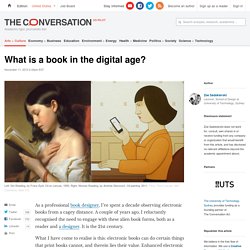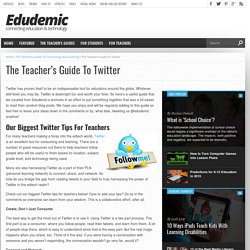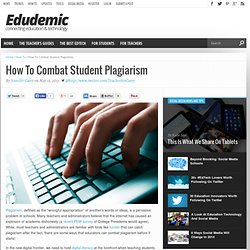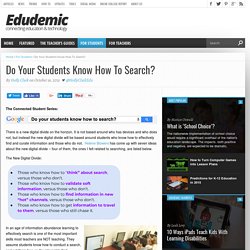

Web-based visualisation tools. Read Aloud - Importance of Reading Aloud. What is a book in the digital age? As a professional book designer, I’ve spent a decade observing electronic books from a cagey distance.

A couple of years ago, I reluctantly recognised the need to engage with these alien book forms, both as a reader and a designer. It is the 21st century. What I have come to realise is this: electronic books can do certain things that print books cannot, and therein lies their value. Enhanced electronic books are changing our definition and expectations of books. My office, home and handbag are still stuffed with print books; eBooks (e for electronic) have not replaced pBooks (p for print) in my life.
I consider the relationships between print and electronic books from the perspective of a reader and designer. The smell and feel of paper Let’s get nostalgia out of the way quickly. Although it’s possible to read an electronic book in a bath, it’s less relaxing and more dangerous (not in a fun way). The technology we use to present and consume information has changed. A Short Guide to Using Google Books for Research. 5 Amazing Ways To Collaborate With Another Class. The Teacher's Guide To Twitter.
Twitter has proven itself to be an indispensable tool for educators around the globe.

Whatever skill level you may be, Twitter is downright fun and worth your time. So here’s a useful guide that we curated from Edudemic’s archives in an effort to put something together that was a bit easier to read than random blog posts. We hope you enjoy and will be regularly adding to this guide so feel free to leave your ideas down in the comments or by, what else, tweeting us @edudemic anytime! Our Biggest Twitter Tips For Teachers For many teachers making a foray into the edtech world, Twitter is an excellent tool for consuming and learning. Many are also harnessing Twitter as a part of their PLN (personal learning network) to connect, share, and network. Check out our biggest Twitter tips for teachers below! Create, Don’t Just Consume The best way to get the most out of Twitter is to use it.
Connect and Network Share Your Resources Keep At It Guide To Education-Oriented Twitter Hashtags Search Rule #1. How To Combat Student Plagiarism. Plagiarism, defined as the “wrongful appropriation” of another’s words or ideas, is a pervasive problem in schools.

Many teachers and administrators believe that the internet has caused an explosion of academic dishonesty (a recent PEW survey of College Presidents would agree). While, most teachers and administrators are familiar with tools like turnitin that can catch plagiarism after the fact, there are some ways that educators can combat plagiarism before it starts! In the new digital frontier, we need to hold digital literacy at the forefront when teaching students how to use and incorporate material into their work. Today’s students are used to rapid answers to questions via quick searches (again, verified by PEW in “How Teens Do Research”). Provide students with meaningful lessons and examples of “real world” plagiarism. Students need to understand why proper citation and documentation is necessary not only in academic research but in “real life.” Do Your Students Know How To Search?
The Connected Student Series: There is a new digital divide on the horizon.

It is not based around who has devices and who does not, but instead the new digital divide will be based around students who know how to effectively find and curate information and those who do not. Helene Blowers has come up with seven ideas about the new digital divide – four of them, the ones I felt related to searching, are listed below. The New Digital Divide: In an age of information abundance learning to effectively search is one of the most important skills most teachers are NOT teaching. Teachers – especially in the elementary grades -need to develop a shared vocabulary around the skill of searching. Here are some of the searching skills and vocabulary we should be teaching students : Quotation Marks: Students should always use quotes to search for an exact word or set of words.
Literacy ShopTalk.